Nikolaos Ch. Tsaloukidis1, Renato Trifoni2*, Dimitrios Ouzounis3, Dimitrios E. Papageorgiou4, Christina Marvaki5, Maria Peponi6
1RN, MSc, General Hospital of Elefsina “Thriassio”, Greece.
2RN, MSc, General Hospital “NEO ATHINEON”, Greece
3RN, MSc, General Hospital of Chalkida, Greece
4RN, MSc, PhD, Lecturer, B' Department of Nursing School of Health and Welfare Professions, Technological Educational of Athens, Greece
5RN, MSc, PhD, Professor of Nursing, Technological Education Institute of Athens
6Department Head Secretary, General Hospital of Athens “Polikliniki”, Greece
- *Corresponding Author:
- Trifoni Renato
Erithreas 4 Street
Kesariani, 16121, Greece
Phone: +30 210 76 00 695
Mobile: +30 694 70 92 673
E-mail: renato_trifoni@yahoo.gr
Key words
Head nurse, Nurse Manager, leadership, transformational leadership
Introduction
It is predicted that by 2010, nursing staff will be globally reduced by 20 per cent [1].Trying to recruit nurses on nursing workforce all managerial and research efforts are made to identify, what nurses want from their leaders at a managerial level [2]. Although all types of leadership are present in Nursing Administration the transformational type of leadership, is positively related with retention [3] and high job satisfaction of nursing staff [4-7].
Realizing what Nursing Staff wants from their leaders, we should also investigate the perceptions of nurse leaders about their own managerial leadership styles. Despite that previous research shows that the majority of head nurses and managers think that they employ transformational leadership, studies on nursing staff’s perceptions indicate that head nurses overestimate their abilities. A possible explanation of this contradictory fact is considered, that nurse leaders are trying to share the same organizational policies with the Medical Organizations concerning the management of costs and productivity, thus failing to develop a transformational type of leadership to a transactional leadership [8].
According to Sellgren et al., [9] where was asked from managers and their subordinates to report the leadership style they believe that managers have, was observed that subordinates disagree almost totally with their managers’ opinion about their managerial leadership style.
The theory of transformational and transactional leadership is one of the most famous theories concerning leadership and it was first introduced by James MacGregor Burns [10]. The transformational leaders influence the followers’ perceptions of what is important through 5 critical strategies [11]: 1) idealized influence or instilling employee pride in the leader’s vision and mission, 2) idealized or behavioral influence or using leader behaviors to demonstrate his/her values and mission to employees, 3) inspirational motivation by increasing staff’s awareness and acceptance of the desired mission, 4) intellectual stimulation by influencing followers to think in new ways, and 5) individualized consideration by mentoring followers or expressing appreciation when the mission and related goals are accomplished.
In contrast, transactional leaders use exchange transactions to reward staff performance using 2 major strategies [4]: 1) contingent rewards by giving constructive recognition for the employees accomplishing the leader’s vision and 2) active management by exception by giving corrective feedback to ensure that specific delegated tasks are accomplished.
Aims
The two-fold aim of this pilot study is to investigate head nurses’ perceptions on their current managerial leadership behaviors and to evaluate a new psychometric questionnaire which can be used for measuring perceptions of head nurses regarding their leadership style.
Material and Methods
Between October and November 2008 a qualitative questionnaire was constructed based on the foreign and Greek literature and assessed to a total of 30 head nurses of Public General Hospitals in Greece. The questionnaire was in the Greek language and consisted of 26 questions. For the interpretation of data a Likert scale was used (1 – Not at all, 2 – A little, 3 – Moderate, 4 – Quite and 5 – Very much). Five groups of leader characteristics were assessed:
1. Sensitivity about peoples (questions 1 – 4)
2. Rigour (questions 5 – 7)
3. Integrity (questions 8 – 10)
4. Humility (questions 11 – 16)
5. Having the guts to make changes for a better tomorrow (questions 17 – 26)
Statistical Analysis
Data were analyzed using the Statistical Package for Social Sciences (version SPSS 13.0). The Fischer’s exact test was used, because of the small size of the sample, for the correlations of the data. The correlations were considered as statistically significant when p – value were less than 0.05 (p<0.05)
Reliability
The questionnaire reliability was estimated by measuring the internal consistency with the calculation of Cronbach’s Alpha (high correlations range between 0.7 – 0.9).
Results
In a total of 30 completed questionnaires, 86.7% were female (n = 26) and 13.3% men (n = 4), 63.3% (n =19) of respondents were 36 – 45 years old, while 33.6% (n=10) were 46 – 55 years old. All heads nurses had higher education but only 10% (n =3) had a postgraduate degree. Mean years of experience in the position of head nurse were 7.8 (+/- 5.03) years. The 29.9% (n=12) questionnaires were from closed nursing departments while 68.8% (n = 17) from open. It is noted that, the Intensive Care Unit, Surgery Theatre, Heamodialysis Unit and Laboratories are considered ‘closed’ nursing departments.
The internal consistency reliability (Cronbach's Alpha) of the total questionnaire was found very high, a = 0.8 and for each of the five subgroups it was found: Sensitivity: a=0.8, Rigor: a = 0.6, Integrity: 0.7, Humility: 0.4 and “Getting to the edges”: 0.8).
About the questions of sensitivity group the largest percentage (67.5%) of head nurses were self characterized as very sensitive and only 0.8% felt that had little sensitivity toward other peoples (Table 1).
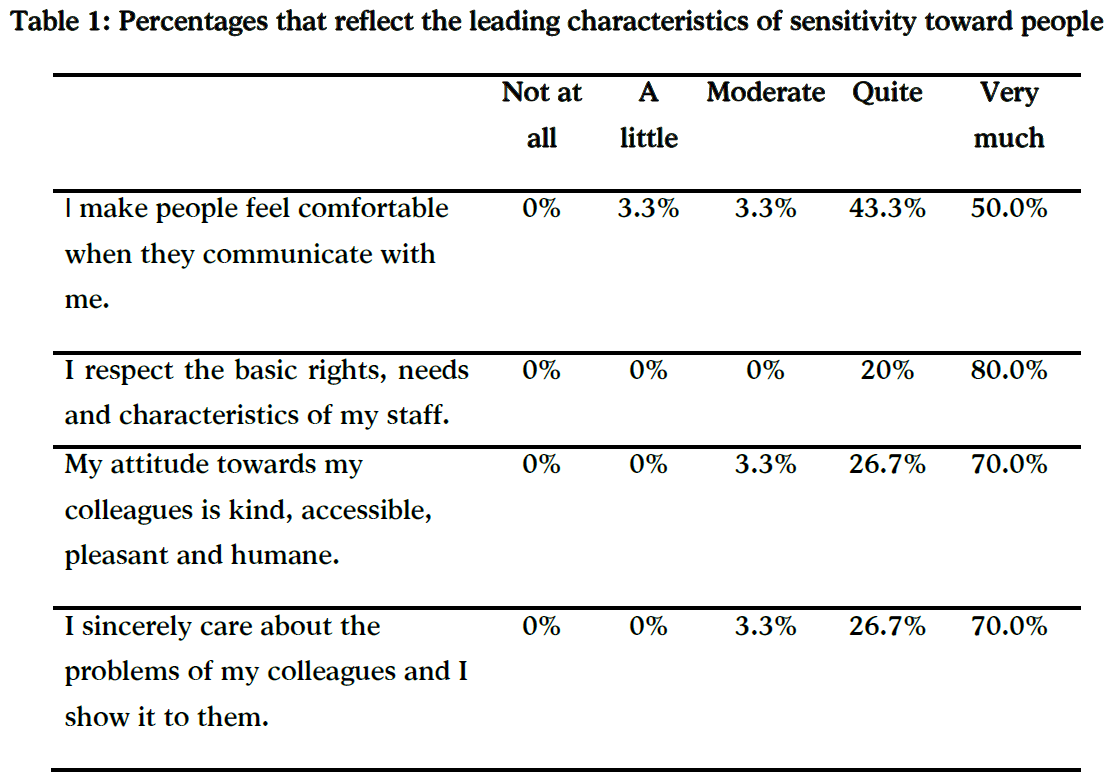
In the group of questions related to “rigour”, 44.4% believed they are quiet strict and 27.8% very strict. Only 6.6% considered themselves not strict at all (Table 2).
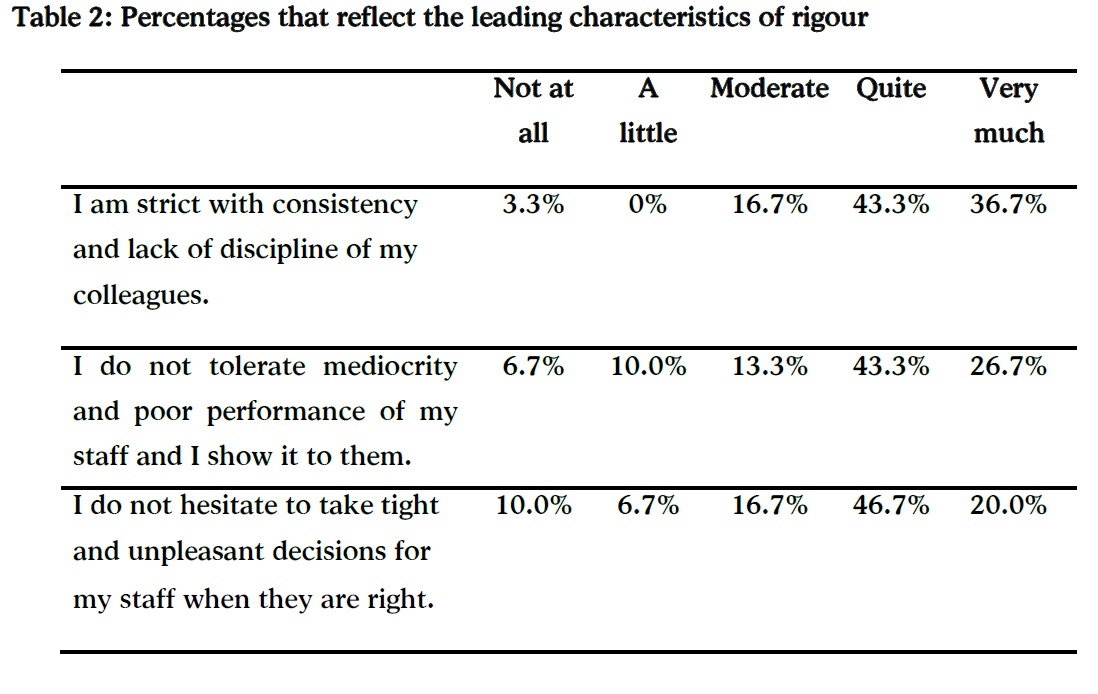
In the group of questions that characterize the integrity ("correct" behavior), 27.8% think they have a quiet "right" behavior and 72.2% a very correct behaviour. None of them thing they don’t have a “correct” behavior (Table 3). Considering the characteristic of "humility" more than half (56.1%) characterize themselves as very humble, while 22.2% feel quiet humble. When the 14.4% think that has little or no “humility” (Table 4).
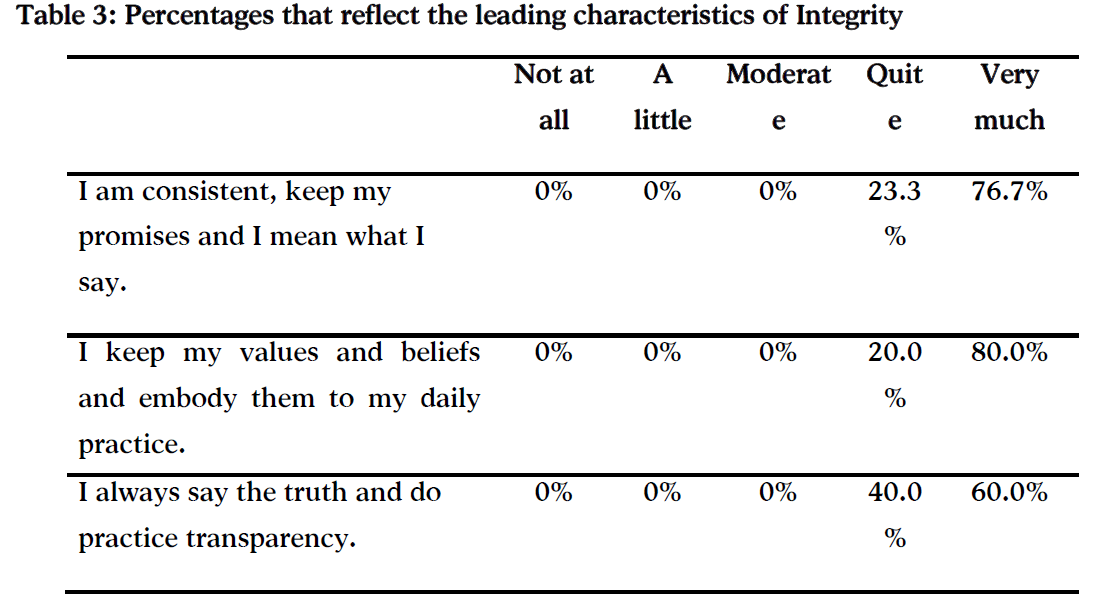
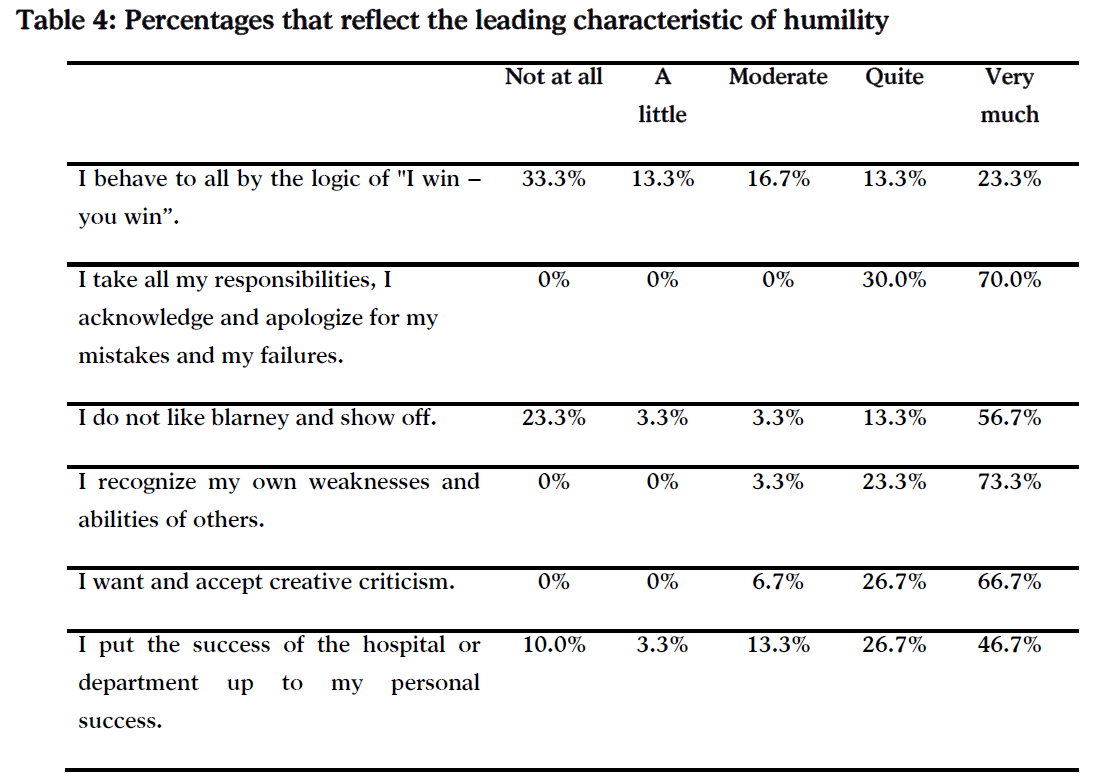
Finally the feature of “guts”, which characterizes the confidence and courage for making changes for a better tomorrow at any cost, we found that more than half (51.7%) believed they would risk very much for changes and only 3.3% wouldn’t risk at all or risk a little (Table 5).
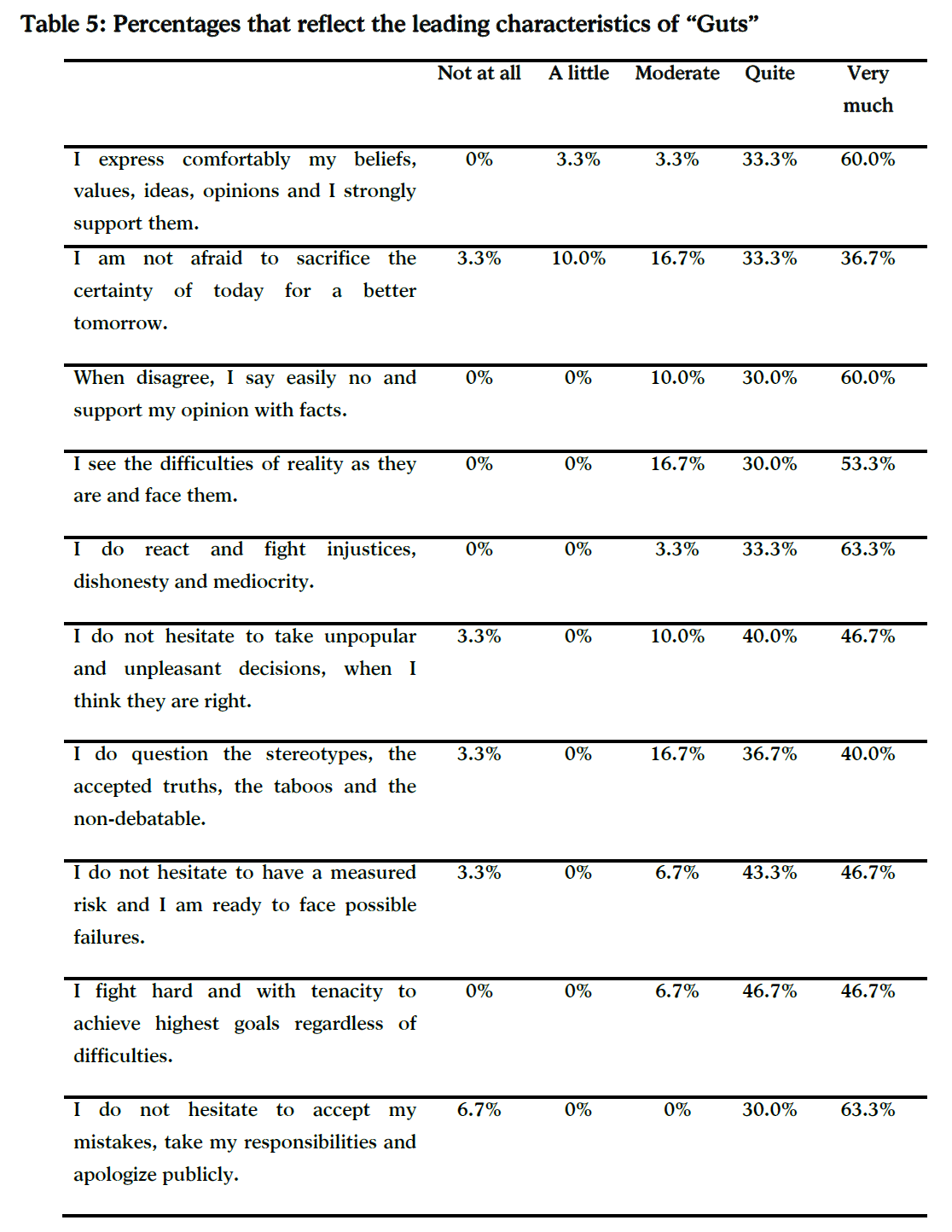
As far as gender is concerned, it was found that female head nurses take more tight and unpleasant decisions than male at a statistically significant level (p <0.05). It was also noted that older head nurses are less tolerant of mediocrity and poor performance at a statistically significant level (p <0,05). Similarly, older head nurses state that they say the truth and do practice transparency easier than younger head nurses (p <0.05).
Comparing perceptions of open and closed section head nurses, head nurses of closed sections hesitate to risk for a better tomorrow comparing to open section head nurses (p <0.05). Comparing the years of experience, head nurses with more years at the leadership position were more like to be opposed to the so-called stereotypes and non-debatable (p <0.05).
Discussion
According to literature, subordinates would like a clearer leadership behaviour and style from their managers [12,13] also they believe that managers overestimate their leadership skills [8,13,14] In our study more than 65% of head nurses think they are quit to very strict and majority of them would make changes for a better tomorrow at any personal cost. This can not be contradicted since their views are subjective and simply note what they think about themselves, but we can assume they exaggerate. Also, in the other four groups of our questionnaire, which characterize the leadership behavior, the majority of head nurses reported themselves as quit to very sensitive, strong, humble and integrity leader.
The instrument which was used to our study explores the five most important elements of leadership and was found to have I high reliability so its use will be very useful for future studies Concluding we should note the limitations of the presented study. This effort is basically a pilot study of a future investigation, which will include a larger sample of head nurses and explore the perceptions of their subordinates about the same leadership characteristics, allowing a comparative research and giving the opportunity for a better interpretation of views and beliefs of both.
Despite the limitations of this study, we must take note of their perceptions and what they think about their own behavior, because they are people who have an important role to the administration of the nursing organization and affect people’s lives and attitudes towards their profession.
Head nurses play a crucial role in the administration of the nursing profession; thus, this study provides a useful insight into their perceptions regarding their leadership type they exercise.
3249
References
- Baggot D, Hensinger B, Parry J, Valdes M, Zaim S. “The new hire/preceptor experience: cost benefit analysis of one retention strategy”, Journal of Nursing Administration, 2005; 35(3):138-145.
- Wieck KL, Prydun M, Walsh T. “What the emerging workforce wants in its leaders”, Journal of Nursing Scholarship, 2002; 34(3):283-288.
- Force M. “The relationship between effective nurse managers and nursing retention”, Journal of Nursing Administration 2005;35(7/8):336-341.
- Bass B.M, Avolio B.J. “Multifactor leadership questionnaire: manual and sampler set”, 3rd ed. Redwood City, CA: Mind Garden,2004.
- Buerhaus P, Staiger D, Auerbach D.“Implications of an aging RN workforce”, JAMA, 2000; 283: 2948-2954.
- Laschinger H.K.S., Finnegan J. “Using empowerment to build trust and respect in the workplace: a strategy for addressing the nursing shortage”, Nursing Economics, 2005; 23(1):6-13.
- Upenieks V. “What constitutes effective leadership? Perceptions of magnet and non-magnet nurse leaders”, Journal of Nursing Administration,2003; 33(9):456 – 467.
- Failla R.K, Stichler F.J. “Manager and staff perceptions of the manager’s leadership style”, Journal of Nursing Administration, 2008; 38(11): 480-487.
- Sellgren S, Ekvall G, Tomson G. “Leadership styles in nursing management: preferred and perceived”, Journal of Nursing Management 2006;14:348-355.
- Bass B.M. “Leadership and performance beyond expectations”, New York, NY: Free Press,1985.
- Morrison R.S, Jones J, Fuller B. “The relation between leadership style and empowerment on job satisfaction of nurses”, Journal of Nursing Administration,1997; 27(5): 27-34.
- McGuire E, Kennerly S.M. “Nurse managers as transformational and transactional leaders”, Nursing Economics, 2006; 24(4):179-185.
- Ohman K.A. “The transformational leadership of critical care nurse-managers”, Dimension in Critical Care Nursing, 2000;19(1):46-54.










